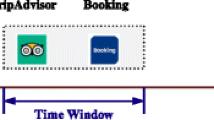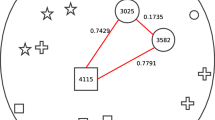Abstract
Many app recommendation models have been proposed to provide mobile users with the apps that meet their individual needs. However, three main drawbacks limit their performance: (1) Neglect the dynamic change of user preferences in a short time; (2) Singly use either the machining learning or the deep learning method, which cannot learn discrete features or continuous features very well; (3) Directly deal with all apps without considering their hierarchical features. To overcome the above drawbacks, this paper proposes a Dynamic behavior-based age Hierarchy Model (DHM for short). To be specific, we integrate the Boosting Tree and Neural Network, combine the static data as basis and the dynamic behaviors as refinement, and update dynamic behaviors in time to improve the accuracy of personalized app recommendation. Then, this paper proposes a User Hierarchy based personalized App recommendation Model (UHAM for short), it exploits the user attribute layering method to make hierarchical recommendation for users in different age groups, which further enhance the efficiency. We conduct extensive experiments with a real app dataset, and the results validate the effectiveness of our model.
Access this chapter
Tax calculation will be finalised at checkout
Purchases are for personal use only
Similar content being viewed by others
References
Agichtein, E., Brill, E., Dumais, S.: Improving web search ranking by incorporating user behavior information. In: Proceedings of the 29th Annual International ACM SIGIR Conference on Research and Development in Information Retrieval, pp. 19–26 (2006)
Burke, R.: Hybrid recommender systems: survey and experiments. User Model. User-Adapted Interact. 12(4), 331–370 (2002)
Cheng, H.T., et al.: Wide & deep learning for recommender systems. In: Proceedings of the 1st Workshop on Deep Learning for Recommender Systems, pp. 7–10 (2016)
Church, K., Ferreira, D., Banovic, N., Lyons, K.: Understanding the challenges of mobile phone usage data. In: Proceedings of the 17th International Conference on Human-Computer Interaction with Mobile Devices and Services, pp. 504–514 (2015)
Dorogush, A.V., Ershov, V., Gulin, A.: Catboost: gradient boosting with categorical features support. arXiv preprint arXiv:1810.11363 (2018)
Graepel, T., Candela, J.Q., Borchert, T., Herbrich, R.: Web-scale bayesian click-through rate prediction for sponsored search advertising in microsoft’s bing search engine. Omnipress (2010)
Grčar, M., Mladenič, D., Fortuna, B., Grobelnik, M.: Data sparsity issues in the collaborative filtering framework. In: Nasraoui, O., Zaïane, O., Spiliopoulou, M., Mobasher, B., Masand, B., Yu, P.S. (eds.) WebKDD 2005. LNCS (LNAI), vol. 4198, pp. 58–76. Springer, Heidelberg (2006). https://doi.org/10.1007/11891321_4
Guo, H., Tang, R., Ye, Y., Li, Z., He, X.: Deepfm: a factorization-machine based neural network for CTR prediction. arXiv preprint arXiv:1703.04247 (2017)
He, X., Zhang, H., Kan, M.Y., Chua, T.S.: Fast matrix factorization for online recommendation with implicit feedback. In: Proceedings of the 39th International ACM SIGIR Conference on Research and Development in Information Retrieval, pp. 549–558 (2016)
Ke, G., et al.: Lightgbm: a highly efficient gradient boosting decision tree. In: Advances in Neural Information Processing Systems, pp. 3146–3154 (2017)
Ke, G., Xu, Z., Zhang, J., Bian, J., Liu, T.Y.: Deepgbm: a deep learning framework distilled by gbdt for online prediction tasks. In: Proceedings of the 25th ACM SIGKDD International Conference on Knowledge Discovery & Data Mining, pp. 384–394 (2019)
LeCun, Y., Bengio, Y., Hinton, G.: Deep learning. Nature 521(7553), 436–444 (2015)
Liao, Z., Huang, Y., Yue, X., Lu, H., Xuan, P., Ju, Y.: In silico prediction of gamma-aminobutyric acid type-A receptors using novel machine-learning-based SVM and GBDT approaches. BioMed. Res. Int. 2016 (2016)
Lika, B., Kolomvatsos, K., Hadjiefthymiades, S.: Facing the cold start problem in recommender systems. Expert Syst. Appl. 41(4), 2065–2073 (2014)
Lin, J., Sugiyama, K., Kan, M.Y., Chua, T.S.: Addressing cold-start in app recommendation: latent user models constructed from twitter followers. In: Proceedings of the 36th International ACM SIGIR Conference on Research and Development in Information Retrieval, pp. 283–292. SIGIR ’2013, Association for Computing Machinery, New York, NY, USA (2013). https://doi.org/10.1145/2484028.2484035
Little, R.J., Rubin, D.B.: Statistical Analysis with Missing Data, vol. 793. John Wiley & Sons, Hoboken (2019)
Liu, D., Jiang, W.: Personalized app recommendation based on hierarchical embedding. In: 2018 IEEE SmartWorld, Ubiquitous Intelligence & Computing, Advanced & Trusted Computing, Scalable Computing & Communications, Cloud & Big Data Computing, Internet of People and Smart City Innovation (SmartWorld/SCALCOM/UIC/ATC/CBDCom/IOP/SCI), pp. 1323–1328. IEEE (2018)
Pazzani, M.J., Billsus, D.: Content-based recommendation systems. The Adaptive Web, pp. 325–341. Springer, Berlin (2007)
Sarwar, B., Karypis, G., Konstan, J., Riedl, J.: Item-based collaborative filtering recommendation algorithms. In: Proceedings of the 10th International Conference on World Wide Web, pp. 285–295 (2001)
Acknowledgment
This research was supported by NSFC grant 61632009, Guangdong Provincial NSF Grant 2017A030308006, the science and technology program of Changsha city kq2004017 and Open project of Zhejiang Lab 2019KE0AB02.
Author information
Authors and Affiliations
Corresponding author
Editor information
Editors and Affiliations
Rights and permissions
Copyright information
© 2021 Springer Nature Singapore Pte Ltd.
About this paper
Cite this paper
Qu, T., Jiang, W., Liu, D., Wang, G. (2021). Deep Hierarchical App Recommendation with Dynamic Behaviors. In: Thampi, S.M., Wang, G., Rawat, D.B., Ko, R., Fan, CI. (eds) Security in Computing and Communications. SSCC 2020. Communications in Computer and Information Science, vol 1364. Springer, Singapore. https://doi.org/10.1007/978-981-16-0422-5_5
Download citation
DOI: https://doi.org/10.1007/978-981-16-0422-5_5
Published:
Publisher Name: Springer, Singapore
Print ISBN: 978-981-16-0421-8
Online ISBN: 978-981-16-0422-5
eBook Packages: Computer ScienceComputer Science (R0)




